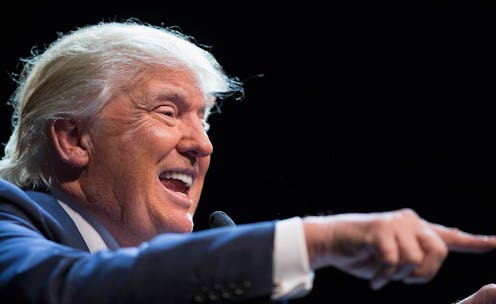News
The Controversial Policy Inspiring Donald Trump
Donald Trump entered the 2016 election on one controversial promise: to round up and deport undocumented immigrants. He's been frustratingly vague on how he plans to accomplish that, until he dropped a crucial clue during the fourth GOP debate on Tuesday when he referenced an immigration policy implemented by Dwight Eisenhower. He didn't reference it by name, but historians immediately took notice. So what is "Operation Wetback," and why isn't Trump distancing himself from it?
When the policy was put in place in 1954, the American immigration climate looked a lot like it does today. Due to worker shortages during World War II, more than 4 million Mexican workers were legally brought into the United States to work through the Bracero program. But when American men returned home from war to find a job shortage and recession, tensions grew. Americans began worrying about the strain that Mexican workers put on the economy, and politicians started to associate the immigrants with the growing crime rate.
To meet these concerns, Eisenhower put Attorney General Herbert Brownell, Jr. in charge of "Operation Wetback," a program that would round up and deport immigrants in a military style. It was named after a racially derogatory term, used to refer to immigrants who swam across the Rio Grande to cross the Texas border. At the end of the program, Brownell claimed to have deported 1 million Mexicans.
To Trump and his supporters, the operation may seem like a success, and a good model to prove that such a deportation attempt is in fact possible. But the problem is that "Operation Wetback" was inherently racist, and caused a whole slew of human rights violations. Immigrants were rounded up en masse, and thousands of legal U.S. citizens were forcibly deported as well. They were taken via train or cargo ship to remote places in Mexico and often left in desert locations without access to food or water. In one situation, 88 immigrants died of heatstroke after being deported across the border.
A congressional investigation into the policy likened the conditions on the cargo ships to that of slave vessels. To keep individuals from crossing back over the border, Brownell gave border officers directions to shoot immigrants on sight. Other individuals had their heads shaved before deportation, so that border patrol could tell if they were attempting to re-enter. Due to public outcry, the program was shut down after a few months.
This is the plan that Trump referenced during the debate on Tuesday, after Gov. John Kasich asserted that it is a "silly argument" to claim that this level of deportation is possible. To counter, Trump referenced Eisenhower, who, "moved 1.5 million illegal immigrants out of this country, moved them just beyond the border. They came back. Moved them again beyond the border, they came back. Didn’t like it. Moved them way south. They never came back.”
One would think that after a thousand journalists Googled "Operation Wetback" Tuesday night, Trump would have worked to distance himself from it. But during an interview with Bill O'Reilly on Thursday, Trump stuck to his guns. "That was brutal what they did to those people to kick them back," O'Reilly said, referencing the operation. "The stuff they did was really brutal, it could never happen today." Trump's response? "We would do it in a very humane way."
Trump's policy has a series of glaring holes. Without addressing the fact that he's basing his reform plan on a 60-year-old failed policy, Eisenhower's program only managed to move 1 million immigrants — which is nowhere close to the estimated 11 million we currently have today. And according to experts like UCLA history professor Kelly Lytle Hernández, the number of individuals removed was likely closer to 250,000.
If Eisenhower and his administration couldn't humanely remove a quarter of a million people, how could Trump and his proposed deportation task forces humanely deport 11 million? As Kasich so simply put it during Tuesday's debate, "Think about the children."
The implications of Trump's immigration policy — and the staggering support it has received — is frightening for the future of America. There are definite lessons that we can learn from history and past policy initiatives. But if the initiative is literally named after a racial slur, then maybe we should leave it in the past.
